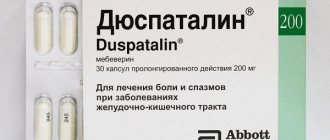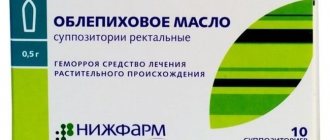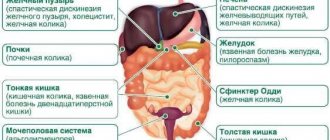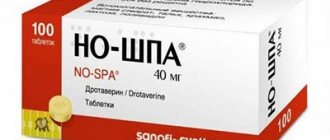Composition and release form
Manufacturers produce the drug in the form of tablets containing 100 or 200 mg of the active ingredient trimebutine. The secondary packaging (cardboard box) contains outline cells and annotation. The tablets are scored for easy dosing. The ingredients of the dosage form include:
- colloidal silicon dioxide;
- corn starch;
- milk sugar;
- magnesium stearate;
- talc.
With the help of auxiliary components, a tablet is formed and the necessary absorption of the active substance by the gastric walls is ensured.
With the help of the drug Trimedat you can quickly get rid of the negative symptoms of flatulence
Pharmacological types
Russians can only buy Trimedat tablets for sale; there is no other form. We offer products produced in Seoul by South Korean and domestic drugs (it is a joint venture with Korea, a packager). The choice of dosage is 100, 200 mg. "Valenta" has improved the medication dose (300 mg) called Trimedat forte (prolonged action and the ability to be used rectally are advertised).
The drug has appeared on the Russian market since 2007. But South Korea has only created a generic version of the original French drug from the 70s of the last century, the Debridat brand. Among the complete analogs in composition have already been produced by different companies: Trimebutin, Trimpa, Neobutin, Neobutin retard, Tribudat. Indian enterprises are especially active.
The differences remain in the design. The Korean drug is characterized by stamping in the form of two opposing drops, both varieties are equipped with risks in the middle for convenient division. Identical aluminum foil blisters protect the tablets from moisture. If necessary, you can choose packaging of 10, 20 and 60 pieces.
How the medicine works
The action of Trimedat is based on the functionality of the active substance. It belongs to the pharmacological group of myotropic antispasmodics (antispasmodics), that is, it works to relieve spasms of smooth muscles. For the drug “Trimedat”, the instructions for use describe how the active substance works. It activates intestinal motility and normalizes the functionality of all structures of the gastrointestinal tract.
Like the work of any organ or system of the human body, the activity of the gastrointestinal tract is determined by a whole system of interconnected processes. For example, intestinal motility also depends on the activity of enkephalinergic neurons that make up the intestinal enkephalinergic system. It is by influencing this area of the gastrointestinal tract functionality that trimebutine exhibits its medicinal qualities. This substance has a dual ability - to suppress excessive spasms, relaxing the muscles, or, conversely, to stimulate peristalsis during hypotension of the smooth muscles of the gastrointestinal tract.
It is noteworthy that Trimedat tablets actively work throughout the gastrointestinal tract, starting from the esophageal sphincter and ending with the muscles of the colon. The active substance helps the process of moving food from the stomach to the intestines, through the intestines, as well as the process of bowel movements. That is why the drug Trimedat receives mostly grateful reviews, helping patients improve the functioning of the gastrointestinal tract in the area of motility.
Trimedat for constipation
Retention of stool lasting more than 2 days requires certain actions from a person. Elimination of the disease must be prompt and comprehensive. This problem can be resolved with special medications. Trimedat qualitatively normalizes intestinal function and promotes the generation of enkephalins in the nervous system. As a result, the prerequisites are formed for restoring the motility of the muscular structures of the suction organ. The patient becomes calmer and more balanced.
Enkephalins are neuropeptides (amino acid particles) that have opioid-like effects. The structures are not classified as narcotic substances, but they highly normalize the functioning of smooth muscles and anesthetize lesions. Enkephalins are molecules that circulate at the level of cell layers and do not enter the general systemic circulation.
The drug helps empty the stomach and gall bladder. Intestinal motility acquires an orderly direction. But this is not a complete list of the mechanisms by which a substance affects the body. You can add to the functionality of the medicine: preventing the reflux of acidic contents into the esophagus, effectively combating constipation and paralytic intestinal obstruction.
The medication is quite well absorbed from the intestines, circulates freely in the bloodstream, is metabolized in liver cells and excreted through the kidneys. The high level of safety of the drug allows it to be used in the treatment of constipation in children from 3 years of age.
After 3 days of taking the medicine, there is a noticeable improvement in the functioning of the muscle structures of not only the large intestine, but also the stomach. This change promotes the quality passage of food in the intestines, preventing its accumulation in the stomach. In this way, you can avoid the fermentation process, which often borders on flatulence, pain and constipation.
Contraindications
The product has extensive indications, but it has few contraindications. You should not take the tablets if you are intolerant (hypersensitivity) to the active substance or other ingredients. Other prohibitions on treatment include:
- first trimester of pregnancy (up to 13 weeks inclusive);
- glucose-galactose malabsorption syndrome;
- lactose intolerance.
In pediatrics, the drug is widely used. It is allowed to drink it from the age of 3, mainly for GERD or functional dyspepsia. It is prohibited to exceed the age-appropriate dosage or use the medicine without a doctor's prescription.
Side effects are rare, and the medicine is usually well tolerated by patients of any age. Still, for some it can provoke the following symptoms:
- diarrhea;
- constipation;
- skin rash;
- urine retention;
- menstrual irregularities;
- drowsiness;
- thirst, dry mouth;
- anxiety.
In very rare cases, long-term use of the medication can cause pain and enlargement of the mammary glands. This requires urgent cancellation of treatment with Trimedat. Among isolated cases of side effects, disturbances in auditory perception of a reversible nature have also been described.
Contraindications of the drug
The dosage form has several contraindications for use.
And when prescribing it to patients, they should be taken into account, otherwise the patient’s condition may only worsen. Contraindications :
- Pills are not prescribed to children who are not yet three years old. This also applies to children's drugs with small dosages of the active substance.
- Trimedat 200 milligrams should not be used by children under 12 years of age.
- It is not recommended to use the tablets for people who have allergic reactions to any component of the drug.
- The dosage form is contraindicated for pregnant women during short periods of up to fourteen weeks of pregnancy.
- Patients with lactose deficiency or lactose intolerance or with glucose-galactose malabsorption should not take Trimedat.
Do not exceed the dosage of the drug to avoid side effects.
Categories
AllergistAnesthesiologist-resuscitatorVenereologistGastroenterologistHematologistGeneticGynecologistHomeopathDermatologistPediatric gynecologistPediatric neurologistPediatric urologistPediatric surgeonPediatric endocrinologistNutrologistImmunologistInfectious disease specialistCardiologistCosmetologistSpeech therapistElorologistMammologistMedical lawyerNarcologistNeurologistNeurosurgeon NephrologistNutriciologistOncologistOncourologistOrthopedist-traumatologistOphthalmologistPediatricianPlastic surgeonProctologistPsychiatristPsychologistPulmonologistRheumatologistRadiologistSexologist-AndrologistDentistTherapistUrologistPharmacistPhytotherapistPhlebologistSurgeonEndocrinologist
What substances are included in the drug
The tablets are round in shape and white in color. The main active component of the drug is trimebutine, its concentration in one capsule is 100 or 200 milligrams.
In addition, Trimedat contains additional substances, which include:
- talc;
- lactose;
- magnesium stearate;
- colloidal silicon dioxide;
- corn starch.
The tablets are packaged in blister packs of ten pieces. There are thirty capsules in total in the package.
Rules for using the drug
Trimedat should be taken only according to the instructions and recommendation of a doctor. The doctor may prescribe treatment with Trimedat for 1-3 months. The duration of therapy depends on the disease and the intensity of pain.
General dosages of the drug:
- for a patient over 12 years of age - 100-200 mg three times a day;
- child 3-5 years of age - 25 mg three times a day;
- child 5-12 years of age - 50 mg three times a day.
Should I take Trimedat before or after meals? The medicine must be used correctly. The speed of action of the drug depends on food. If the remedy is taken before meals, it acts much faster. Taking the medication with food greatly reduces its effectiveness.
The connection between taking Trimedat and food
Trimedat should be taken 15-30 minutes before meals. It is better to take the medicine with water. There is no need to chew the tablet.
After eating, you can also drink Trimedat, but you need to wait 20 minutes. During this time, most of the food is slightly digested and passes into the duodenum. The effect of this technique will be slightly lower. Patients with gastritis in remission are prescribed to take the drug more often after meals. This reduces the likelihood of damage to the mucosa during course therapy. Food protects the walls of the stomach and prevents them from being too irritated.
Trimedat price, where to buy
The cost depends on the country, region and pharmacy chain. The price of 200 mg tablets No. 30 in Russia is 600-700 rubles.
You can buy it in Ukraine at an average price of 300 UAH.
- Online pharmacies in RussiaRussia
ZdravCity
- Trimedat tablets 100 mg 10 pcs. JSC Valenta Pharm
294 rub. order - Trimedat Forte tablets p.p.o. with prolonged release 300 mg 20 pcs. JSC Valenta Pharmaceuticals
625 rub. order
- Trimedat tablets 200 mg 30 pcs. JSC Valenta Pharm
RUR 553 order
- Trimedat forte tablets with prolong. release p.o.p 300mg 60pcs JSC Valenta Pharmaceuticals
RUB 1,355 order
PHARMACHOLOGIC EFFECT
Among other things, the central nervous system produces substances called enkephalins. They have a morphine-like effect on the body, reducing the pain threshold and sensitivity. Due to their properties, they are classified as analgesics that have an anesthetic effect. Their action or inaction in the gastrointestinal tract affects its motor activity, which causes diarrhea or constipation. Trimebutine, which is the main component of Trimedat, affects the enkephalinergic system of the digestive tract and thereby regulates its peristalsis. The medicine acts “consciously”:
- When there is excessive activity of smooth muscles, it has an antispasmodic effect, eliminating diarrhea and pain in the abdomen.
- When its activity is suppressed, it is used as a stimulant, which helps treat constipation.
It differs favorably from other drugs with similar effects in that:
- Works throughout the entire digestive tract.
- It affects the rate of bowel movement, which helps relieve diarrhea or constipation.
- Reduces the pressure exerted by the sphincter.
- Helps increase the sensitivity of the smooth muscles of the colon to food irritants.
- Normalizes the natural activity of the muscles of the large and small intestines in diseases of the digestive system caused by disruptions in motor functions.
Taken before or after meals, depending on symptoms. As a result of oral administration, the medicine is rapidly absorbed from the digestive tract. The highest possible concentration in the blood plasma is reached after an hour and a half. The liver is responsible for the metabolism of the substances present in Trimedat, and 70% of the formed metabolites are excreted by the kidneys during the first day. The half-life occurs after 12 hours.
Side effects
In most cases, no side effects are observed after taking the drug. It is safe and non-aggressive in its effects on the body.
However, in exceptional cases, Trimedat may provoke the following abnormalities:
- allergic reactions;
- temporary hearing impairment;
- mental disorders in the form of causeless anxiety;
- nausea and diarrhea due to intolerance to components, such as lactose;
- menstrual irregularities;
- tachycardia.
Taking the drug may cause increased heart rate, which is manifested by rapid pulse
Such manifestations disappear very quickly after stopping the drug.
Side effects can be reduced by reducing the dosage. In this case, it is possible to continue treatment with Trimedat. If there is a deterioration in the patient's condition, the use of the medicine is completely excluded.
Related and recommended questions
Duspatalin and constipation Recently, constipation has often bothered me, but there is no pain...
Side effects from medications Elena Vladimirovna. I was treated for a long time (7 months)…
Bend gallbladder Hello, I am worried about pain in my right side, sometimes colitis, sometimes...
Constant severe pain The pain in the stomach has persisted for 2 years, despite...
Exacerbation of chronic cholecystitis For a year and a half I have been suffering from periodic pressure...
Complications after starting treatment I experience pain in the stomach area. Repeatedly passed...
Pain in the right hypochondrium when inhaling, coughing, sneezing. Perhaps you can help me! I live...
Stomach pain after Phenibut After taking Phenibut (took 3 weeks 2…
Very severe pain at the entrance to the vagina. My name is Sabrina. I am 20 years old. When I left...
Cancellation of the lutein drug at 22-23 weeks I would like to ask, I have been taking it since 6 weeks...
Ulcer associated with Helicobacter Five years ago, stomach pain began. I suffered...
I had a sore throat, how to cure pancreas I had a sore throat 2 weeks ago, I stopped taking amoxcillin,...
It’s hard to breathe I have this situation, last Saturday night I started having difficulty breathing,...
Nausea while eating, stomach pain, fever. It started at night...
Metrodinazole I’ve had a stomach ache in the navel area for a couple of months, it’s shooting and it’s aching…
Feeling unwell after treatment for Hilicobacter pylori Tell me what to do Were...
Gastroduodenopathy and stomach pain I am currently taking hormonal pills. On the background…
Gastroduodenopathy and Diane-35 Today I had a gastroscopy. Diagnosis: gastroesophageal...
Pain during menstruation when taking Dimia I am 19 years old. I have a problem with my periods (cycle...
Cancellation of chimes before childbirth Please tell me how long before childbirth you need to quit...
Analogues of the drug
The chemical composition of drugs and pharmacological action are the main criteria influencing the classification of drugs. Having analyzed the mechanism of influence on the disease, one can notice similar properties. Manufacturers often produce cheaper analogues to make medicines available to different groups of people. Alternatives to Trimedat:
- "Mukofalk" is an effective medicine for diarrhea and constipation. Adults and children drink 2 sachets per day. At the same time, drink 1.5 liters of water/24 hours. The drug begins to act 10 hours after administration. Read the instructions before use.
- "Creon" is an enzymatic medicine that is actively used for diseases of the pancreas. The main component of the compound is lipase, which helps with constipation. The dosage is presented in two types: 10,000 and 25. The capsules are covered with a gelatin shell. The medicine is effective for bloating, flatulence and abdominal pain.
- “Spakovin” is a pharmacological product that has an antispasmodic spectrum of action and effectively dilates blood vessels. Gastroenterology prescribes for IBS and long-term constipation.
- "Papaverine". The medicine is presented in tablets, solutions and suppositories. The antispasmodic agent actively reduces the amount of calcium ions in the muscles. Choose the optimal dosage at the pharmacy. The medication is addictive.
- "Meteospasmil" is a drug that neutralizes spasmodic pain in the abdomen. The intestines come into shape in a short period of time. The medicine helps with chronic constipation.
The article was approved by the editors
pharmachologic effect
The drug Trimedat is synthesized to regulate peristalsis. The drug is used to increase the functional activity of any organs of the gastrointestinal tract. Trimedat is also indicated for use by patients diagnosed with spastic spasms that interfere with the proper breakdown of food and their absorption. The drug regulates the speed and amplitude of the movement of the food bolus, affecting the smooth muscle muscles of the internal walls of the predominantly large and small intestines.
Pharmacodynamics
Thanks to Trimedat ensuring proper motor motility of the digestive organs, nutrients and biologically active substances are completely absorbed by cells and tissues. And the antispasmodic effect of the drug allows you to prevent or quickly relieve pain that accompanies the negative symptoms of flatulence:
- excessive gas formation;
- constipation or diarrhea;
- seething and rumbling in the stomach;
- nausea and vomiting.
The therapeutic effect of Trimedat is to eliminate the pathological signs that arise:
- when overeating;
- after eating fatty, salty, spice-rich foods.
Trimedat normalizes the removal of food from the stomach and restores the functioning of the sphincter located in the esophagus. The backflow of undigested food into this hollow organ is prevented, so the symptoms of reflux disappear in a person - nausea, vomiting, sour belching and painful heartburn. Thus, the indications of Trimedat include various diseases that occur against the background of a decrease in the functional activity of the gastrointestinal tract to promote the food bolus.
Pharmacokinetics
After penetration into the stomach, Trimedat is quickly absorbed by its walls and enters the bloodstream. After 1.5 hours, the drug accumulates in the plasma at the maximum therapeutic concentration. The active ingredient Trimedat trimebutine binds to blood proteins in small quantities, which ensures its low penetration through biological barriers in the human body.
Transformation of the pharmacological drug occurs in hepatocytes (liver cells). Large metabolites are formed, which are excreted from the body by the urinary system. Trimedat does not have a cumulative effect and is not detectable in the blood plasma after 10-12 hours. This is taken into account by gastroenterologists when selecting individual dosages and determining the duration of course treatment.
What effect does Trimedat have on the patient’s body: tablet form
As already mentioned, there are different names for the drug, but in essence there is no difference in the composition of the tablets, the medicine is simply produced by different pharmaceutical companies and the word Valenta is used to uniqueize the name. This is done in order to obtain documentation from factories for further registration of the trademark by the manufacturer.
Pills can contain 100 or 200 milligrams of active ingredient. The shape of the tablets is flat-cylindrical, color - white. The drug belongs to the group of drugs that take part in regulating the motor functions of the esophagus. The active ingredient is trimebutine maleate . The substance can influence the peristalsis of the esophagus, normalizes the functioning of the sphincter, effectively affects the functioning of the large intestine, and promotes the removal of feces.
The effect of Trimedat is to equalize the forces of contractions of the esophagus and movements in all parts of the intestine. Thanks to this, the food bolus moves at the required speed. Food does not stay in different parts of the esophagus, and, moreover, it does not move very quickly throughout the entire area. This leads to normal functioning of the organ, and subsequently eliminates all symptomatic reactions that are associated with various pathologies. In particular, these are: bloating, constipation, diarrhea, colic, pain in the peritoneum.
Tablets – Trimedat
IMPORTANT : The therapeutic effect of the drug is limited only to the elimination of the symptomatic manifestations of various ailments. Therefore, it must be used in combination with other dosage forms. It is not advisable to self-medicate. Before using the pills, you need to consult a specialist who will establish the correct diagnosis and prescribe the necessary treatment regimen.
Use during pregnancy and breastfeeding
Trimedat is not officially approved for use during pregnancy; clinical trials have not been conducted on pregnant women (for ethical reasons). Therefore, there is no reliable data on the safety of the drug.
But laboratory experiments on animals indicate the absence of embryotoxic and teratogenic effects on the fetus. Therefore, the drug can be prescribed in the second and third trimester. But only a doctor can recommend it for use.
Doctors do not know the extent to which trimebutine passes into breast milk. Therefore, if treatment is necessary during breastfeeding, it is worth transferring the baby to adapted infant formula or stop breastfeeding (if the baby’s age allows).
Trimedat's analogs
Level 4 ATC code matches: Aprofen
Meverin
Niaspam
Duspatalin
- trimebutine
- Tribudate
- Debridat
- Neobutin
The price of analogues in Ukraine is less than the original drug. For example, the analogue of Trimedat Tribudat can be bought for 40 UAH.
Indications for use
Gastroenterologists often use the ability of the drug to normalize the motility of the digestive tract, for which they prescribe Trimedat to patients with irritable bowel syndrome. This pathology of neurogenic origin is difficult to treat and requires the use of sedatives. The use of Trimedat allows, after a single dose, to reduce the severity of dyspeptic manifestations - increased gas formation, bloating, belching and peristalsis disorders. Trimedat's testimony also includes:
- gastroesophageal reflux disease is a chronic relapsing disease in which gastric or duodenal contents are regularly thrown into the esophagus;
- decreased functional activity of the digestive tract associated with impaired regulation of smooth muscle contractions of the stomach and (or) intestines;
- carrying out preparatory procedures before X-ray or endoscopic examination of the gastrointestinal tract;
- reducing the severity of dyspepsia symptoms in children with diagnosed pathologies of the gastrointestinal tract.
Indications for the use of Trimedat are any digestive disorders that occur against the background of impaired motility of the stomach and intestines, regardless of its decrease or increase. Such diseases are characterized by swallowing air when eating food, uncomfortable sensations of rumbling and distension of the abdomen, and the appearance of pain in the epigastric region.
Reviews for Trimedat
The drug is well tolerated, acts quickly enough, relieving spasms, pain, and stabilizing intestinal function. For constipation , the medication enhances peristalsis, ensuring quick, painless emptying of the large intestine.
Reception by children, reviews from parents
In case of irritable bowel syndrome, the drug stabilizes motility, restoring the full functioning of the digestive system.
Reviews from doctors about Trimedat
An effective, affordable drug, widely used for pathologies of the digestive system.
Pharmacokinetic features of the drug
Trimedat belongs to the group of myotropic antispasmodics, which act primarily on the muscular structures of the gastrointestinal tract for better movement and absorption of food. The active component stimulates the contractility of the smooth muscles of the intestine, sphinctral parts of the esophagus and the colon cavity. At the same time, an antispasmodic effect occurs during hyperkinesis of the muscle tissue of the digestive tract, and stimulation of the intestines occurs during hypokinetic manifestations.
The drug has a targeted effect on problems with smooth muscle tissue and muscles. Long-term use improves the quality of bowel movements and reduces pressure on the sphincter in the esophagus. The active components of Trimedat act throughout the entire intestinal cavity, enhancing the muscle response to food and other provocations. The product is effective for any diseases of the gastrointestinal tract.
The bioavailability indicator after oral administration reaches 6%. The drug breaks down into active components after entering the stomach, and the peak concentration in the blood plasma is observed after 2 hours. A small proportion of the drug passes through the placenta to the fetus during pregnancy. Biochemical transformation occurs in the liver structures, and all undigested particles or metabolites are excreted in the urine.
Is Trimedat an antibiotic?
Trimedat is prescribed by doctors for inflammatory diseases of the digestive system (gastritis, enterocolitis, paraproctitis), but it does not have antibiotic properties. The drug does not have the necessary methods of influencing the microbial cell. Antibacterial agents can stop the development or kill pathogenic organisms.
With prolonged use they cause resistance (resistance or addiction). Therefore, the course of antibiotic treatment is always limited to 7-10 days. Trimedat is allowed to be taken for a long time if it does not stimulate negative consequences.
Restoring food transport helps correct the imbalanced balance of beneficial bacteria in the large intestine. therefore, indirectly, the drug prevents dysbiosis and creates favorable conditions for the spread of the necessary flora.
Trimedat how to take before or after meals indications for use
Before you start taking pills, you should study the dosage regimen and other information from the instructions. This medicine is used to eliminate the following symptoms:
- Elimination of obstruction (paralytic), which sometimes occurs after surgery.
- Reducing irritable esophagus syndrome, if it is manifested by pain, intestinal spasms, diarrhea, or vice versa - constipation, an unpleasant feeling of distension in the peritoneum.
- Reducing the manifestations of reflux gastroesophageal disease, dyspeptic signs of gastrointestinal disorders, which can occur with defects in intestinal motility.
- Getting rid of such unpleasant symptoms as nausea, vomiting, both in adults and children.
- Also, these pills are prescribed by medical specialists in preparation for various types of endoscopic and x-ray examinations of internal organs (esophagus, stomach).
Features of the effects of trimedate
Reviews and opinions
Most of the reviews are positive. Many people note that with colic, bloating, constipation and other similar conditions, the tablets helped very quickly. Patients who have undergone abdominal surgery note that when taking the medicine, discomfort in the intestines completely disappeared.
The tablets have many grateful reviews from people who drink them during exacerbation of chronic pathologies (stomach ulcer, gastritis, colitis, enteritis). There are also positive reviews from parents who gave Trimedat to their children for flatulence, bloating and constipation.
There are few negative reviews; they mainly concern possible side effects after taking it.
Trimedat is a popular and inexpensive remedy that helps quickly eliminate discomfort and improve the functioning of the gastrointestinal tract. It is prescribed mainly for constipation, IBS, flatulence, in the postoperative period and to eliminate the symptoms of certain chronic gastrointestinal pathologies. Allowed for children over 3 years old.
Trimedat - instructions
In order for the pills to act correctly on the body and contribute to the patient’s rapid recovery, the drug should be taken exactly as directed. Usually the tablets are swallowed with liquid (a cup of water is enough). Tablets are taken three times a day, 100 or 200 milligrams. This dosage is recommended for adults and children over the age of twelve. For children from six to eleven, it is enough to take 50 milligrams three times a day. Toddlers three to five need 25 milligrams three times a day.
The treatment course is determined individually. For example, for manifestations of irritable esophagus syndrome, a four-week course of taking the drug is sufficient. For preventive purposes, take tablets of one hundred milligrams per day for about three months. For diseases of the digestive organs (in particular: pancreatitis, cholecystitis, GERD, gastritis, ulcers), the drug is used until symptoms disappear or for two to three months. After which it was necessary to take a break for about three months.
The effect of the pills does not appear immediately; the patient feels relief only after two weeks of use. If a person has acute symptoms in the form of nausea, belching, vomiting, intestinal colic, then it is recommended to use the product according to the instructions in therapeutic dosages and short courses. Stop taking the pills when the symptoms completely go away. Sometimes the use of tablets in maximum doses reduces the manifestations of diseases to nothing within three days.
For preparatory measures for endoscopic procedures or x-ray examinations, pills are taken in the amount of 100 milligrams twice a day or as recommended by a doctor. After surgical interventions, Trimedat is also taken according to the recommendations of medical specialists; usually, for adults, the dosage is 100 or 200 milligrams three times a day until the symptom of paralytic postoperative obstruction passes. This period can vary between four and six weeks.
How to use the drug?
How to take the drug before or after meals?
Many medications are taken regardless of food intake and are effective in any case. Trimedat is best consumed before meals, both for children and adults. Doctors recommend taking pills 15-20 minutes before a meal, so the remedy will be more effective. If you cannot take the tablet on time, you are allowed to take it after eating twenty to thirty minutes.
This regimen is effective with planned use of the drug. If symptoms (pain in the peritoneum, spasms of the esophagus, colic) occur suddenly, then you should not wait twenty to thirty minutes after eating, you should use the remedy immediately to relieve unpleasant symptoms. And the dosage is determined according to the instructions, both for adults and for children.
What kind of constipation does Trimedat help with?
Trimedat will help with almost all mechanisms of defecation retention:
- atony resulting from a sedentary lifestyle or becoming a complication of surgical intervention;
- spasm due to intestinal colic;
- overeating or poor nutrition, causing difficulty in the passage of feces through the intestinal loops;
- indigestion due to obstructed passage of the bile ducts (with pancreatitis or cholecystitis);
- neurological disorders accompanied by increased tone of the anal sphincter (stress, strong emotions, climate change).
Trimedat works more effectively when constipation is caused by poor diet or neurological factors. In other cases, healing will take a little longer.
A doctor should prescribe the drug for constipation after identifying the cause and determining the severity of constipation . You cannot drink Trimedat on your own if you have a long delay in bowel movements - incorrect use of the medication can aggravate the condition.
Dosage
The tablets are taken orally with plenty of water. A line on one side of tablets of different dosages allows you to accurately divide them if necessary. The official instructions for use define the following permissible doses for different categories of patients:
- adult patients over 12 years of age (100 to 300 mg three times a day);
- children from 3 to 5 years (up to 50 mg three times a day);
- young children (up to 25 mg 2-3 times a day).
The dosage is selected individually depending on the severity of the disease. For gastritis, Trimedat is prescribed simultaneously with defoamers and mucosal restorative agents. For ease of use of the drug by children, Trimedat is available in the form of suspensions.
If necessary, you can divide the tablet into 4 equal parts, grind 1/4 into powder and dissolve in water before taking. Thus, it is possible to accurately calculate the required dose for adults and children.
"Trimedat" for children
The drug is not prescribed to children under 3 years of age. For older children, it is indicated in the appropriate age dosage (regardless of the type and severity of the illness) for dyspeptic symptoms (heartburn, diarrhea, constipation, abdominal pain and bloating, heaviness in the stomach). They can appear after overeating, introducing new foods, carbonated liquids into the diet, acclimatization, or excess nervous and physical activity. The course of taking the medication (usually one to three days) is stopped when the symptoms of indigestion disappear.
Longer courses of medication use (from 30 to 60 days) are prescribed when the following are diagnosed:
- pancreatitis;
- gastroduodenitis;
- gastritis;
- gastroesophageal reflux disease, etc.
An age-specific tablet dose can be turned into powder and mixed with water (juice) and given to a small child to drink. For children, the drug is prescribed only by a doctor.
Properties of the medicine
Trimedat can be purchased at pharmacies in tablet form. The tablets have several dosages: 100 mg, 200 mg, 300 mg. A dosage of 300 mg is necessary to prolong the therapeutic effect for severe abdominal pain.
The therapeutic component is trimebutine maleate. The drug acts on β-μ-, k-receptors, activating them. The medicine can also affect the receptors of the intestine itself. This leads to a weakening of spastic movements. With the use of Trimedat, patients experience pain relief, stool normalizes, and the formation of gases in the intestinal cavity decreases. The medicine has no central effect on the body, which allows it to be used even in pediatric practice.
After administration, the drug enters the stomach and is absorbed into the bloodstream. The maximum concentration of the active component is recorded after 60-120 minutes. The medicine may pass through the placenta in small quantities. Metabolism of the drug occurs in the liver tissue. The drug is excreted in the urine.
Indications for use of Trimedat:
- flatulence, pain in the abdomen;
- change in the nature and frequency of stool;
- irritable bowel syndrome;
- dysfunction of the digestive organs (reflux esophagitis, changes in the functioning of the gallbladder, improper functioning of the sphincter of Oddi);
- intestinal obstruction after surgery;
- preparatory activities for additional studies (ultrasound, radiography).
Trimedate is not indicated for use in case of an allergic reaction during its use. The drug is not used during pregnancy and lactation. In pediatrics, the drug is prescribed to the child individually. Dosages may vary depending on the age group.
Undesirable manifestations of the drug:
- fatigue;
- vestibular disorders;
- headache;
- rash due to an allergy to the drug;
- loose stools or constipation;
- dyspepsia;
- menstrual irregularities in women;
- enlargement of the mammary glands;
- decrease in the amount of urine.
To exclude the occurrence of unwanted effects, you need to take Trimedat correctly. Before using the medicine, you should consult a doctor. He will draw up a treatment regimen and prescribe the necessary dosages.
Analogues of the drug:
- Neobutin;
- Duspatalin;
- Trigan.
Neobutin is a structural analogue of Trimedat. Its cost is lower. Duspatalin and Trigan are not structural analogues. They have a different composition. The cost of Duspatalin is almost the same as that of Trimedat. Trigan is a cheaper remedy, but it has more undesirable effects and restrictions on use.
More information about the drug
The drug is included in a complex treatment regimen with the aim of restoring normal excretion of feces from the intestines, eliminating flatulence and associated intestinal colic, belching, a feeling of heaviness and bloating in the abdomen. Its effectiveness has been proven by the results of a number of randomized studies.
They differ in appearance and some composition of excipients: in the Russian version, povidone is additionally present. This component accelerates the dissolution of the drug and increases its bioavailability.
Trimedat is available only in tablet form in three doses: 100, 200 and 300 mg. Trimedat Forte, which has a high dose of the active substance (300 mg), is intended for a single dose during the day, in severe cases it is prescribed twice a day.
The main active component of Trimedat, trimebutine maleate, has an affinity for the chemical structure of intestinal receptors, which are involved in the stimulation and relaxation of its smooth muscle cells. Affects the humoral regulation of the digestive organs:
- increases the level of motilin, a hormone that regulates gastrointestinal motility;
- reduces the synthesis of other hormones produced in the pancreas that are involved in digestive processes - glucagon, gastrin, VKP (vasoactive intestinal peptide), pancreatic polypeptide.
Therefore, the drug has a stimulating effect on the muscles of the digestive tract in case of their hypotonicity and acts as an antispasmodic in their hyperkinetic state.
This achieves relaxation of the sphincter and stimulation of peristalsis of the large intestine, which facilitates daily bowel movements. The drug, according to the official instructions, regulates the motility of the entire digestive tract, but mostly the intestines. The intensity of peristalsis in all its parts is leveled out and becomes uniform. As a result, the passage of the food bolus improves and its progress accelerates: it moves evenly along the digestive tube, without stopping or quickly skipping any parts of the intestine. In this regard, many symptoms associated with impaired peristalsis are relieved:
- nausea, accompanied in many cases by vomiting;
- diarrhea or constipation;
- flatulence;
- pain in the epigastrium and along the intestinal segments.
Composition and release form
The action of Trimedat is due to the presence of trimebutine in the composition. The remaining substances are auxiliary and do not have a pharmacological effect:
- talc;
- magnesium stearate;
- colloidal silicon dioxide;
- corn starch.
The dosage of the main active ingredient per 1 tablet is 100 mg or 200 mg.
In pharmacies the drug can be found under two names: Trimedat and Trimedat Valenta. These medicines do not differ in the components they contain. The difference lies in the country of origin:
- Trimedat Valenta - produced in Russia;
- Trimedat - manufactured in the Republic of Korea.
Release form
Trimedat is available in tablets of 100 and 200 milligrams.
100-milligram tablets have a flat-cylindrical shape with characteristic, cross-shaped, intersecting indentations (they are convenient for breaking the tablet into four parts, which may be necessary if the patient is prescribed a lower dose of medication) on one side and the letters T and M (Trimedat) and six triangles ( three on top and bottom) on the other.
The 200-milligram tablets come in a slightly different form. They are round, biconvex, with two drop-shaped indentations on one side and an approximate line dividing each tablet into two equal parts on the other.
Both forms of the drug are sold in blisters, each of which contains ten tablets hermetically sealed. Blisters are packaged in cardboard boxes, 1, 2 or 3 in each. Thanks to this, you can purchase exactly as much of the drug as prescribed, and at the end of the course of treatment you do not have to worry about what to do with almost the entire package.
Indications for use
The doctor makes an appointment and directs the correct treatment. Symptoms susceptible to the effects of the drug may occur in the following cases:
- various ailments in the stomach and intestines with unexpressed symptoms;
- absence of a surgically removed gallbladder;
- deviations in the functions of the gallbladder (stones in the canals and organ, variations in the volume of bile secreted when the ducts narrow/expand);
- stomach/intestinal ulcers;
- therapy after surgery (against the background of constipation, intestinal obstruction);
- colitis, gastritis;
- diarrhea, constipation that do not have an infectious component;
- preparation for endoscopic and x-ray examinations;
- severe food poisoning, painful cramps;
- flatulence, bloating, when the pain is localized in the upper abdomen;
- dyspepsia, including in children, in which pain, vomiting, nausea, intestinal colic, constipation, rumbling in the abdomen, and diarrhea are observed;
- severe irritability, intestinal spasms;
- uncomfortable heaviness in the stomach, especially when eating fatty, spicy foods with spicy spices;
- gastroesophageal reflux disease, etc.
pharmachologic effect
The drug begins to act on the gastrointestinal tract 1.5 hours after taking the tablet (duration of action - 5 hours). It is believed that for an effective systemic effect on the entire digestive system, it should be taken three times during the day. After administration, trimebutine begins to normalize the contractility of the stomach muscles, affecting the layers of the epithelium.
The speed at which food bolus leaves the stomach is optimized. The pressure of the esophageal sphincter on the stomach is normalized, which prevents the backflow (reflux) of food and acid into the esophagus, leading to vomiting, heartburn, and nausea. This ensures relief of stomach pain.
Trimebutine restores and stabilizes the lost physiological activity of the intestinal muscles (peristalsis), which is often the cause of ailments of the digestive system. "Trimedat" evens out and coordinates the intensity of muscle contractions and movements of all parts of the long intestine. Food begins to move through it at a speed optimal for the body.
As a result, daily bowel movements are carried out more naturally and easily, and the response of the colon to food irritants is optimized. The biological availability of the active substance does not exceed 6%. It accumulates and decomposes in the liver, and is excreted in the urine (about 70% in the first day).
Trimedat belongs to the category of antispasmodic drugs. It has a gentle effect on the intestinal contraction system. The drug is quite safe for the body, so it can be taken for a long time. Trimebutin has the properties of a targeted effect on the smooth muscles of internal organs. Thanks to this, it has the following effect:
- stimulates muscle contraction in hypokinetic disorders;
- relieves spasms in hyperkinetic manifestations of diseases, for example, pancreatitis;
- eliminates colic and bloating;
- restores intestinal motility and eliminates constipation; restores normal functioning of the sphincter of Oddi;
- improves the flow of bile and digestive enzymes;
- promotes the manifestation of the correct intestinal response to undigested food;
- promotes the timely movement of food from the stomach to the intestines.
Thanks to Trimedat, it is possible to normalize the digestive process and restore the correct chain of reactions of the gastrointestinal tract to incoming food. Unpleasant sensations, heaviness in the stomach, cramps are eliminated. In case of problems with the gallbladder and pancreas, it is possible to restore the full flow of digestive juices and enzymes into the gastrointestinal tract. When taking the drug, it has a special effect on the intestines, as it is possible to normalize its motility. Thanks to the targeted effect of the active substance, problems of both directions are eliminated: both hyperkinetic and hypokinetic.
Application and dosage
The dosage of the drug is prescribed by the doctor.
The drug "Trimedat" is prescribed to adults and children. The dosage should correspond to the age category of the patient. The following dosages have been established:
- people aged 12 years and older - one tablet containing 100 (200) mg of trimebutine (depending on the condition) three times a day;
- children from 5 to 12 years old - 50 mg (1/2 tablet of the minimum dosage) three times a day;
- for children from 3 to 5 years old - 25 mg (1/4 tablet of the minimum dosage) in three doses during the day.
The duration of the course is set depending on the patient’s condition and the characteristics of the disease (the standard dosage may be reduced).
Features and contraindications
Medicines have absolute and relative contraindications. If the former exclude the use of Trimedat, then the latter allow its use after eliminating certain factors. The main contraindications include:
- young children (contraindications given);
- children under 12 years of age (indications noted by the South Korean manufacturer of Trimedat);
- individual intolerance to any components;
- glucose-galactose malabsorption;
- pregnancy (I and II periods of gestation).
Contraindications are due to the lack of research data in children and pregnant women. Despite manufacturers' prohibitions, Trimedat is widely used in pediatric practice in appropriate dosages.
How to take Trimedat correctly for an adult
It is not difficult for an adult to take the drug in tablet form with water. It is not recommended to bite into pieces or pre-grind the tablet into powder. You cannot replace water with juices, tea, or mineral water. The amount of medicine is determined by the doctor. Usually 100-200 mg three times a day is sufficient. For constant heartburn and belching in a horizontal position, it is recommended to take a tablet at night.
Trimedat forte is prescribed 1 tablet 2 times a day with a break of 12 hours. We did not find a detailed description and convincing effectiveness of rectal use of tablets. Perhaps the method has not been sufficiently tested in practice. It should not be used without an official opinion.
Maximum daily dose
The allowed daily dose is 600 mg. Accordingly, it is calculated how many tablets depending on the weight (100, 200 or 300 mg) should be taken per day. For the treatment of children under 12 years of age, there are age standards; the child’s weight is taken into account.
How to drink Trimedat: before or after meals
Trimedat should be taken half an hour before meals. If you forgot or something interfered, you can take the pill 20 minutes after.
Duration of treatment: how many days to take Trimedat
The duration of therapy is determined by the doctor in a particular case. The drug can be prescribed by a doctor for life for older people with severe digestive disorders and the inability to eliminate problems with chewing food.
For irritable bowel syndrome, the course lasts 30 days, then it is recommended to take Trimedat for another 3 months as an anti-relapse treatment.
The drug is included in the complex of antiulcer therapy for seasonal exacerbations. It is recommended to use 300 mg per day at least twice a year for 2-3 weeks. Exacerbation of chronic pancreatitis, reflux disease, and cholecystitis is similarly prevented. The courses are repeated at intervals of 3 months.
If the drug is prescribed before an intestinal examination, then you should drink it for 3 days, 200 mg three times a day.
Peculiarities
Before treatment, you need to thoroughly familiarize yourself with the annotation for Trimedat, and also pay attention to several features of the correct use of the drug. The drug can be purchased at pharmacies without a doctor's prescription. Trimedat should not be taken during pregnancy and lactation, since there is no reliable information about safety.
If you have any doubts regarding their correct use, you should consult your doctor. To date, no cases of overdose have been reported.
Instructions for use for Trimedat 100 mg, 200 mg indicate that the shelf life of the medication is thirty-six months. It must be kept in packaging, in a place protected from light at an air temperature of no more than plus twenty-five degrees, and also kept away from children.
Instructions for use
The dosage of the drug for children is indicated by the manufacturer. Children from 3 to 5 years old need to take 25 mg of the drug per day, from 5 to 12 years old - 50 mg three times a day. Children over 12 years of age receive an adult dose of 100–200 mg of the drug daily.
Since the drug is produced with a minimum content of the main component of 100 mg, a quarter or half of a tablet must be used for a child. If only 200 mg tablets are available, you need to divide it into 8 and 4 parts, respectively.
If a small child does not know how to swallow tablets, the required part can be crushed into powder using a regular teaspoon, and then add a little water to form a suspension. You can also add the crushed tablet to a drink or sweet jam, which will be similar to syrup.
The medicine should be given 30 minutes before or 20 minutes after meals. The course of treatment can be either one-time or long-term – up to several months.
There are no cases of overdose recorded in the medical literature. If parents are sure that the child has taken a large amount of medicine, it is necessary to seek medical help, and in the meantime, perform gastric lavage with a weak solution of potassium permanganate. Then the child should be given an absorbent, for example, Smecta, and monitor his health for 24 hours. If symptoms such as constipation or diarrhea occur, apply symptomatic treatment.
Absorption and excretion
The active component is well absorbed in the digestive tract. The rate of binding of the substance to blood proteins is five percent. The active substance slightly overcomes the placental barrier and penetrates the fetal tissue. Converted in liver tissue and excreted by the kidneys.
The degree of bioavailability reaches six percent. The maximum level of the chemical compound in the blood is reached 60-120 minutes after oral administration. The half-life is twelve hours.
Directions for use and doses
It is recommended to take Trimedat a few minutes before meals for both adults and children. You can do it after eating, but after 30 minutes.
If any negative symptoms appear after eating, such as cramping or pain, it is recommended to take the drug immediately.
For adults
In order to get maximum effectiveness from treatment, it is recommended to take Trimedat before meals in an amount of 50 to 200 mg three times a day.
It is better to consult a doctor who will make the correct diagnosis, select the optimal dose and duration of treatment.
There are general recommendations:
- For irritable bowel syndrome, it is recommended to take the drug for a whole month, 200 mg three times a day.
- For prevention, reduce the dose to 100 mg three times a day for two weeks.
- Before preparing for a study of the digestive system, it is recommended to follow the age-specific dose and take the drug one to two times a day.
- It is recommended to take the drug for one month after surgical treatment of intestinal obstruction.
Only a specialist can correctly calculate the optimal dose, taking into account the condition of a particular patient.
For children
- The drug can be taken after 3 years, but only after consulting a doctor.
- Children over 3 years old can take 25 mg three times a day.
- Children over 6 years old are prescribed 50 mg three times a day.
- After 12 years, you can take an adult dose, namely from 100 to 200 mg at a time.
It is recommended to start with a minimum dose in order to identify side effects in time and stop treatment.
Use during pregnancy and breastfeeding
According to the manufacturer, no studies or experiments have been conducted on pregnant women, so it is impossible to say with confidence about the absolute safety of the drug. In addition, the active substance is absorbed into the blood and has the ability to penetrate to the fetus through the placenta. Therefore, it is recommended to take Trimedat during pregnancy only in the absence of contraindications and after consulting a doctor. You need to be especially careful in the early stages of pregnancy, when the formation of important fetal organs is observed.
Experts do not recommend taking the drug while breastfeeding, because the main components can enter the baby’s body through breast milk. In this case, it is better to choose another drug that is not absorbed into the blood.
Indications
"Trimedat" is prescribed for intestinal problems of various origins, including abdominal pain, vomiting, diarrhea, and constipation. The medicine is used to relieve symptoms and treat dyspeptic intestinal disorders, for example, early satiety, a feeling of fullness.
Trimedat Valenta, produced by a Russian pharmaceutical company, is recommended for children aged three years and older. However, as prescribed by a pediatrician or gastroenterologist, the medicine can be used earlier, for example, from 2 years of age.
Independent use of Trimedat in children under three years of age is not recommended, since the effect of the drug on children in this age group has not been studied in clinical settings. At the same time, the metabolism of young children differs from that of adults and older children.











